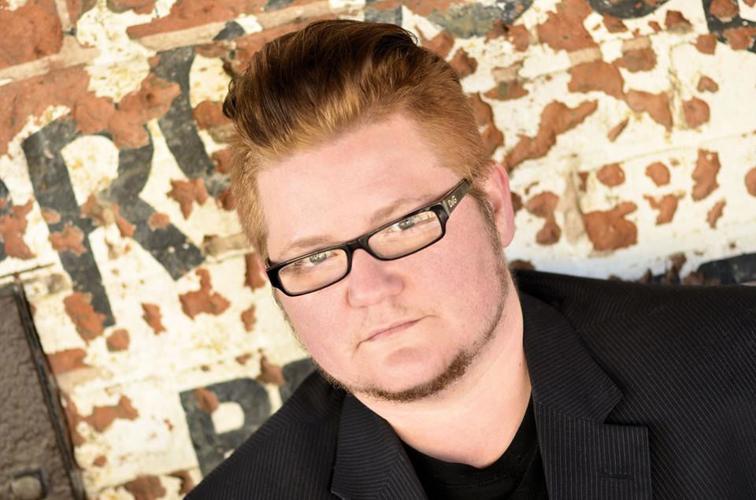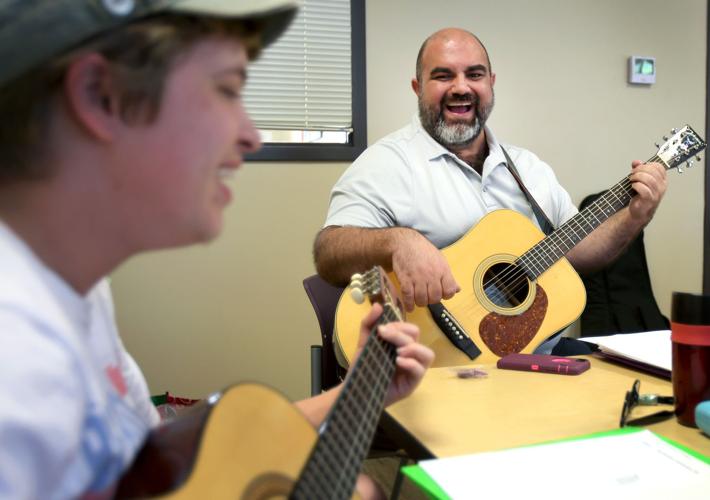The blazing heat and stifling humidity of summer’s peak can be brutal, especially for former Tucson resident Donnie Cianciotto.
Where most can throw on a T-shirt and brave the muggy August commutes, Cianciotto, a transgender man, dons multiple layers to hide the noticeable bulge of his chest. He’s still in the process of transitioning through gender reassignment surgery, stalled by denial after denial for a breast removal procedure.
He wears a constrictive binder beneath his clothing. Sometimes, he said, just having the will to leave the apartment is a challenge.
Transition, or the altering of one’s sex assigned at birth, can be a complex process that occurs over extended periods of time. Transition happens in different ways for different people, from changes in preferred pronouns to hormone therapy. Some, like Cianciotto, choose sex reassignment surgery to physically transition from one gender to another.
Before Cianciotto moved from Tucson back to New York City in 2016, he faced a lengthy battle with Arizona’s Medicaid agency for coverage of his testosterone prescriptions and other surgical procedures related to his transition. He has been physically transitioning for four years, but feels like he’s been living as a man his whole life, he said.
Transitioning is different for everyone, he said, but the emotional toll of waiting for transition-related care can be “tremendously disheartening and emotional.”
Barriers to treatment
Access to health care and provider sensitivity toward transgender patient care remains a challenge in many facets of the U.S. medical system.
Despite federal prohibitions on discrimination against transgender patients, many still face high out-of-pocket medical costs and lengthy appeals to insurers for coverage of transition-related care, advocates say.
In a 2012 National Center for Transgender Equality’s discrimination survey, 19 percent of respondents said they were denied medical care for their transgender or gender non-conforming status. Fifty percent said they had to educate their provider about transgender care.
Forty-one percent of transgender respondents reported attempting suicide, and the rate is even higher for victims of bias, harassment and poverty. Numbers like these make access to adequate care a priority for advocates.
Organizations in Tucson, like Living out Loud at CODAC Behavioral Health Services, provide support for transgender patients. Chad Mosher, program coordinator for Living Out Loud, said Tucson offers transgender patients good access to mental and physical health care, but the struggle continues in other parts of the country.
Insensitive providers
For hospitals and providers who haven’t undergone sensitivity training, inappropriate behavior can be common.
Mosher said he counsels individuals who have dealt with everything from misgendering in an exam room to inappropriate exchanges at the scene of crashes. Many times, just having to prove oneself in a male-female system can be exhausting, especially for those whose gender identity falls outside the traditional categories of man or woman.
At the Trans*studies conference held at the University of Arizona in September, first of its kind held nationally, panelists from around the world addressed issues of access and proper transgender care within health-care structures, including the need for a gender dysphoria diagnosis for certain kinds of treatment.
Patients seeking reassignment surgery must obtain a diagnosis of gender dysphoria, which means a person’s birth gender is different than the gender they identify with. But Mosher said this and other requirements can put additional burdens on the patient.
“We kind of have to fight through to make sure that we get what we need, whether it’s getting in to see someone for hormones, having to explain why they’re seeking it, having to justify through a diagnosis of gender dysphoria, which is not a perfect system,” he said.
Eric Plemons, a UA assistant professor and faculty in the Transgender Studies Initiative, which sponsored the conference, said barriers to care started, in part, due to a 1979 Johns Hopkins University study that claimed reassignment surgery was “not beneficial” to patients. Despite coming under fire as a bad study, Plemons said it gave insurers a pretext to deny coverage for the surgeries and led to the closure of clinics that specialized in transgender health care.
“For those people who were just looking for some reason to stop providing this care, that study provided a really good tool for them,” Plemons said.
In 1981, the Department of Health and Human Services decided to exclude “transsexual surgery” from Medicare, Medicaid and private insurance coverage soon following suit. The stall of coverage was followed by clinic closures, and the number of physicians who specialized in transitional care plummeted, Plemons said.
Coverage denials
In Arizona, AHCCCS denied approval for Cianciotto’s double mastectomy, despite his letters from three doctors saying the procedure was medically necessary. AHCCCS responded that there was “no proof it would be beneficial to a transgender person,” Cianciotto said of the denial letter.
Since Cianciotto’s appeal was denied for the first time in 2015, recent provisions in the Affordable Care Act address discrimination against transgender patients. The U.S. Department of Health and Human Services issued a rule in May that prohibits discrimination based on sex in all health systems overseen by the department.
Claire Swinford, member of the Southern Arizona Gender Alliance board of directors, said the denial and appeals process is a “murky” area. Although insurers cannot give blanket exclusions, patients are still routinely denied coverage due to “lack of medical necessity,” as medical necessity is not fully defined by law, Swinford said.
Monica Coury, a spokeswoman for AHCCCS, said in an email that medical necessity is the primary coverage criteria for benefits and “is determined on a case-by-case basis by physicians.”
After denials, appeals can eventually end up at the Arizona Department of Insurance or the Office of Civil Rights at HHS, creating “many battles” over coverage that Swinford hopes will eventually create “a large enough body of appeal rulings and court cases to define the parameters of medical necessity,” Swinford said in an email.
Local advocacy groups and a growing number of trained hospitals and doctors put the Tucson community ahead in terms of transgender care, thanks in large part to the efforts of the Southern Arizona Gender Alliance.
Founded in 1998, the alliance has been working to provide Tucson health-care professionals with sensitivity training related to using proper pronouns, raising comfort levels of doctors and informing personnel of changes within the transgender community so they can better provide care.
“You’re building a culture, and once that culture is built then you’re golden,” Swinford said.





